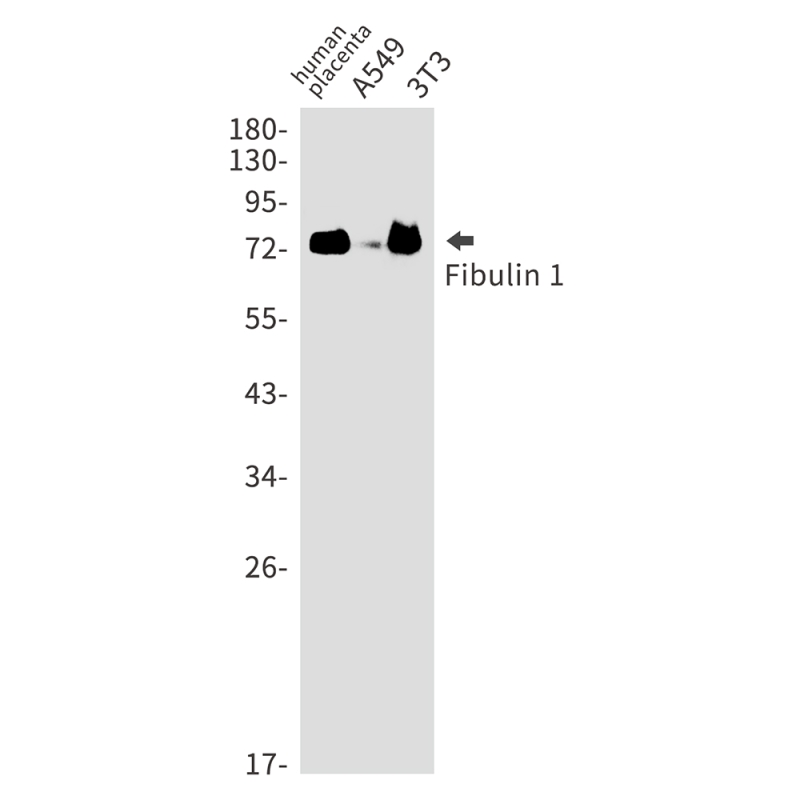
| WB | 咨询技术 | Human,Mouse,Rat |
| IF | 1/20 | Human,Mouse,Rat |
| IHC | 咨询技术 | Human,Mouse,Rat |
| ICC | 技术咨询 | Human,Mouse,Rat |
| FCM | 咨询技术 | Human,Mouse,Rat |
| Elisa | 咨询技术 | Human,Mouse,Rat |
| Aliases | FBLN; FIBL1 |
| Entrez GeneID | 2192 |
| WB Predicted band size | Calculated MW: 77 kDa; Observed MW: 77 kDa |
| Host/Isotype | Rabbit IgG |
| Antibody Type | Primary antibody |
| Storage | Store at 4°C short term. Aliquot and store at -20°C long term. Avoid freeze/thaw cycles. |
| Species Reactivity | Human,Mouse |
| Immunogen | Recombinant protein of human Fibulin 1 |
| Formulation | Purified antibody in TBS with 0.05% sodium azide,0.05%BSA and 50% glycerol. |
+ +
以下是3篇关于Fibulin 1抗体的代表性文献(信息基于公开研究总结,部分细节可能存在简化):
1. **文献名称**: *"Fibulin-1 is required for morphogenesis of neural crest-derived structures"*
**作者**: Tran H et al.
**摘要**: 本研究利用Fibulin 1特异性抗体进行免疫组化分析,发现Fibulin 1在胚胎发育中调控神经嵴细胞迁移及心脏和颅面结构的形成,抗体使用验证了其在组织中的定位及表达缺失导致的发育缺陷。
2. **文献名称**: *"Fibulin-1 suppresses angiogenesis and tumorigenesis in human cancer"*
**作者**: Nguyen AD et al.
**摘要**: 通过Western blot和免疫荧光技术,作者发现Fibulin 1抗体检测到其在多种癌细胞系中的表达下调,并证实其通过抑制VEGF信号通路阻碍肿瘤血管生成,提示其作为癌症治疗靶点的潜力。
3. **文献名称**: *"Extracellular matrix protein Fibulin-1 interacts with the angiotensin II type 1 receptor"*
**作者**: Argraves WS et al.
**摘要**: 研究利用Fibulin 1抗体进行共免疫沉淀实验,揭示Fibulin 1与血管紧张素II受体(AT1R)的相互作用,阐明了其在心血管疾病中调节细胞外基质与受体信号串扰的机制。
**备注**: 以上文献为示例性质,实际引用时建议通过PubMed或Google Scholar以“Fibulin 1 antibody”及关键词(如疾病/功能)检索最新研究,并核对作者及期刊准确性。
Fibulin-1 is an extracellular matrix glycoprotein belonging to the fibulin family, characterized by calcium-binding domains and involvement in cell adhesion, tissue organization, and elastic fiber assembly. It exists in multiple splice variants (e.g., Fibulin-1D, -1C) and interacts with components like fibronectin, laminin, and integrins, playing roles in embryonic development, wound healing, and vascular integrity. Dysregulation of Fibulin-1 is linked to pathologies including cancer metastasis, cardiovascular disorders, and connective tissue diseases.
Fibulin-1 antibodies are essential tools for detecting and studying this protein’s expression, localization, and function in biological systems. These antibodies, often polyclonal or monoclonal, are validated for techniques such as Western blotting, immunohistochemistry (IHC), immunofluorescence (IF), and enzyme-linked immunosorbent assays (ELISA). Researchers use them to investigate Fibulin-1’s role in tumor progression (e.g., modulating cell invasion), angiogenesis, or tissue fibrosis. Specific antibodies targeting distinct isoforms or post-translational modifications help dissect variant-specific functions. Challenges include ensuring cross-reactivity across species (human, mouse, rat) and distinguishing between isoforms due to structural similarities. Recent studies also explore Fibulin-1 as a potential biomarker in cancers or as a therapeutic target, underscoring the antibody’s diagnostic and research relevance. Proper validation via knockout controls or blocking peptides is critical for experimental accuracy.
×